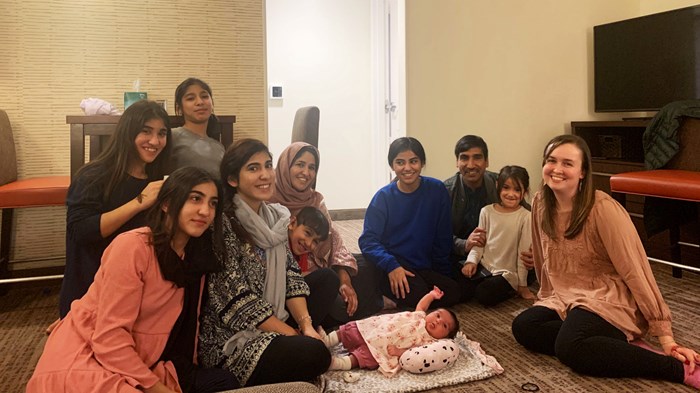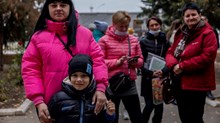One Year After Finishing a Graduate Degree in How to Be a Humanitarian Leader

Nearly a year has passed since World Relief, a US refugee resettlement agency, offered me a job in my own city of Greenville, SC, just before I graduated with my Master’s in Humanitarian & Disaster Leadership from Wheaton College. I was thrilled to accept this opportunity because my goal of working with refugees had been the reason I pursued my master’s in the first place.
For the last year, I have been privileged to play a part in offering relief to people directly impacted by two major international crises–those of Afghanistan and Ukraine. As a Resettlement Specialist, my job is to assist refugees who are assigned to our office with housing, documents, medical appointments, government benefits, and numerous other basic needs.
Sometimes my small team only has a few days to prepare for arrivals, and we have to be available for middle-of-the-night airport pickups. Nothing ever seems to go as planned, as flight delays or cancellations are not rare and problems related to housing or documents frequently arise. The task before us requires patience, flexibility, and above all, faith.
World Relief is a faith-based organization, and we pray each morning for God to meet the needs of our refugee clients. We depend heavily on our church partners to provide temporary housing, furniture and material needs, transportation to appointments, and friendship to these people who have lost everything and are trying to rebuild their lives in a foreign country. I won’t lie–my job is overwhelming most of the time, and I sometimes feel weak and helpless with the weight of responsibility of so many people who depend on me, their caseworker. But the Lord has not failed them once, and I am daily challenged to put my trust in him when I have nowhere else to turn.
No two days at work are the same. On a “typical” day, I may start by conducting cultural orientation in a Sudanese family’s home with an interpreter; then I may need to take an Afghan family to their first medical appointment. After that I might need to call the Social Security office, or Medicaid, or a dentist, depending on the needs of the Ukrainian family that just texted me. The following day may find me taking a Guatemalan mother grocery shopping and teaching her how to use food stamps. I might need to hurry then to the airport to pick up a Congolese family whose flight is set to arrive earlier than scheduled. Another big part of my job is documenting all of these interactions to ensure no needs fall through the cracks.
The degree program at Wheaton challenged me to rethink my preconceived notions about poverty, immigration, and aid work. One’s approach should be holistic, aimed at uplifting people physically, emotionally, and spiritually. At World Relief, we seek to provide for refugees materially, but we also understand that they need to become self-sufficient as well as integrated into their new community. Some of the people we receive come to the US as refugees so they can join family already living here, but many others are fleeing violence, torture, and oppressive regimes. Still others come to the US after spending 20+ years in a refugee camp, where their work opportunities are extremely limited and their movement restricted.
Many, if not most, refugees can never return to their origin country and are therefore forced to part with some members of their families forever. Of the millions of displaced people around the world, very few can hope to be resettled in the US. And while resettlement may offer initial feelings of relief and security, it is only the beginning of a long and very difficult road. For these reasons and more, refugees should not be stereotyped or condescended. Rather, Christians are called to love their neighbors (Galatians 5:14). And make no mistake, refugees are your neighbors.
Though it was my job to welcome them, they welcomed me.
In November and December, we welcomed several Afghan families, and the week of Christmas, four of these women had babies. We worked with our church partners to take them grocery shopping, clothes shopping, and to their medical appointments. Though it was my job to welcome them, they welcomed me, inviting me to drink tea, to share in their meals, to have my hands canvassed in henna, and to hold their newborn babies. In March we put on an “Afghan tea” in order to get all of our Afghan families together at the same time.
I love seeing Upstate South Carolina becoming a refuge to a group of people who previously had little to no representation in this area. I have so enjoyed being a friend and offering some rest to these amazing people who escaped an extremely dangerous situation.
Suzanna Edwards graduated from Wheaton in August 2021 with her MA in Humanitarian & Disaster Leadership. She lives in Greenville, SC, where she works as a Refugee Resettlement Specialist at World Relief.
The Better Samaritan is a part of CT's
Blog Forum. Support the work of CT.
Subscribe and get one year free.
The views of the blogger do not necessarily reflect those of Christianity Today.





















